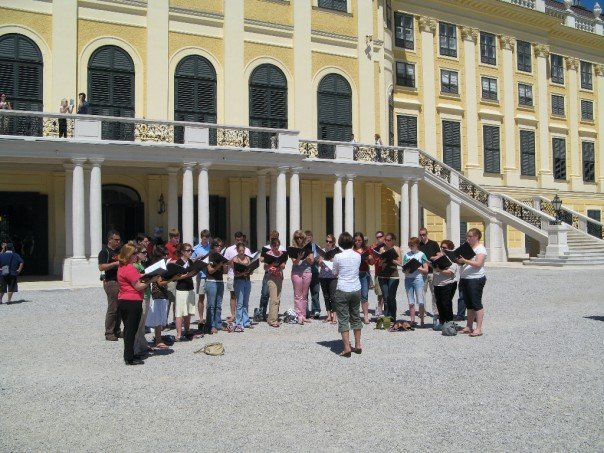We're at the 19-day marker, y'all.
It sounds a little better right now to say "a little less than three weeks" — seems like that gives us more time to get everything in order for the BIG DAY.
We have collections of pewter dishes, ribbons, wine bottles, and Christmas decorations (from the Christmas Choir Kick-Off this weekend) lining our entryway.
I have about eight pieces of clothing hanging on my closet door (literally since the first week of August) to bring to the dry cleaner.
I am going to try on my dress this weekend for the first time since April.
The pace of life is fast right now... and by fast I mean flying.
This week, that meant typing up grant applications for the WCMW while driving to VT for wedding errands, emailing schedules to the wedding vendors while sitting at the laundromat, checking emails on my Blackberry in between choir rehearsals, and writing out the seating chart for the rehearsal dinner on scratch paper in the car.
Oh, and I downed my coffee/hot chocolate this morning in three minutes flat before running out the door to get ready for church.
The question, "Am I keeping up with everything?" is one that I ask myself at least five times a day. Can you relate?
Albert Einstein has some pretty great words of advice for people like us: "Life is like riding a bicycle: In order to keep your balance, you must keep moving."
I think balance is a key word here.
Forward motion is important, but it doesn't drive everything. In order to get everything done that needs to be done, I need balance in my life.
For me, balance means:
taking a breather from emails on the weekends (at least from my school account)
spending less time on my laptop/Blackberry on the weekends in general
taking time to cook dinner with Steve on weekend nights (last night, we made apple- and bacon-stuffed pork chops with a maple glaze)
not lingering at church after the service — cleaning up the Choir Room can wait until Monday evening
making time to do something on the weekend that I wouldn't normally do during the week (for instance, yesterday, I made fresh guacamole... up until the point when I sliced my finger open with our brand new tomato knife. Steve had to take over on this one.)
spending a few minutes at the end of each day writing down everything I want to remember in the morning
taking a short walk to the Post Office after lunch (fresh air + exercise + no Blackberry = mental breather)
sending more emails from my Blackberry during the day (in between things) rather than waiting until I am at my computer again
How do you keep up? How do you achieve balance in everyday work?


 Recently, I had the opportunity to attend a choral workshop in western Massachusetts with Alice Parker. The soft-spoken, grey-haired woman dressed in bright colors had the room of 15 attendees mesmerized for two 3-hour sessions. You’d never know she was in her mid-eighties. In addition to reflecting on her experiences (her time at Juilliard and the opportunity to work with the great Robert Shaw), Alice spoke of the qualities that make music powerful and captivating.
Recently, I had the opportunity to attend a choral workshop in western Massachusetts with Alice Parker. The soft-spoken, grey-haired woman dressed in bright colors had the room of 15 attendees mesmerized for two 3-hour sessions. You’d never know she was in her mid-eighties. In addition to reflecting on her experiences (her time at Juilliard and the opportunity to work with the great Robert Shaw), Alice spoke of the qualities that make music powerful and captivating.




